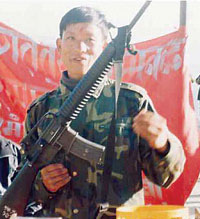 Last Thursday a dozen big manufacturing units in Birganj shut down because of Maoist extortion and threats. The reaction to this from the Maoists, the government and the Maoist leadership gives us some interesting insights. The truth is that the Maoists want to join mainstream peaceful politics, but before that they need to amass as much resources as possible. It is convenient for them to go back to the people who they had extorted before and intimidate them into parting with more money.
Last Thursday a dozen big manufacturing units in Birganj shut down because of Maoist extortion and threats. The reaction to this from the Maoists, the government and the Maoist leadership gives us some interesting insights. The truth is that the Maoists want to join mainstream peaceful politics, but before that they need to amass as much resources as possible. It is convenient for them to go back to the people who they had extorted before and intimidate them into parting with more money.
The fact that many of these industries didn't have a unionised work force made it easier for the Maoists to penetrate these institutions saying they were just trying to fight for workers' rights. But things had changed, many of the industrialists refused to give in to the demands. Instead, they gave the Maoists an ultimatum and said that unless the extortion stopped they would close down all industries. This is an opportunity for a government installed by people power to show that it controls the security apparatus. And it also is a test of whether the Maoists are really serious about restoring peace.
As it turned out, the Maoists themselves suffered a major setback. They may be good at military strategy, but in peacetime they have been a failure. They don't understand that peaceful competitive politics demands a different sort of behaviour than while being a part of an underground guerrilla movement. The contradictory statements issued by various Maoist leaders about the extortion campaign has harmed them even more and exposed the beginnings of a rift within the movement.
Hence, the government could strongly challenge the Maoists and Prachanda had to publicly refute that his organization was involved in extortion and call for peace talks to be expedited. It seems the Maoists now are in more of a hurry to start negotiations.
The delay in the peace process may have been due to disarray within the NC-D, but the effect is that it has tarnished the Maoist image and allowed the government to put forth conditions before talks begin.
It is estimated that the Maoists have between 10-12,000 fighters and another 20,000 supporters. It is reported that they get Rs 500 a month as pocket money which means they need less than Rs 140-150 million a month or Rs 2 billion a year to sustain their corps. So the demand by the Maoist leadership for half the national budget is absurd. If the government can buy peace by paying the Maoists less than three percent of its annual budget, then it is cheap. The Maoists must also regard this as a great achievement since this means the rank and file will be taken care of, they may not have to answer for all the terrorist activities and for ruining the country's economy and they can be seen as a political force that stands for peace.
The lesson from this latest episode is that the peace negotiations will not be meaningful without the Maoists being confined to barracks.


